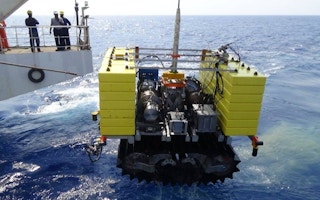The conflict in Ukraine has highlighted the vulnerability of mineral supply chains, and provided impetus to supporters of a controversial method for sourcing valuable metals that could be used in the energy transition — deep-sea mining.
To continue reading, subscribe to Eco‑Business.
There's something for everyone. We offer a range of subscription plans.
- Access our stories and receive our Insights Weekly newsletter with the free EB Member plan.
- Unlock unlimited access to our content and archive with EB Circle.
- Publish your content with EB Premium.
Russia’s invasion has pushed up the price of gold, nickel, silver, and palladium, and triggered fears of supply chain disruption, as Russia and Ukraine are key producers of several of these metals. Russia is one of the biggest producers of gold, nickel, and platinum-group metals, which are used to make electric vehicle (EV) batteries, solar panels and wind turbines. Ukraine is a major producer of iron ore, uranium and coal.
Global demand for critical minerals is set to soar in the next two decades. As a result, nations are racing to secure supplies of critical minerals. Countries have tried to reduce their dependence on China, which dominates the refining and processing of critical minerals, amid geo-political tensions.
Deep-sea mining firm The Metals Company (TMC), which formed a US$2.9 billion business after a merger last year, said in a marketing email on 2 March, that the war has alerted world leaders to the reality that energy-transition metals are concentrated in “geopolitically difficult jurisdictions”.
“We are starting to see more political and military leaders consider the national security implications of mineral dependence on countries like Russia (produces 20 per cent of class I nickel) and China (dominates battery materials supply chain)…and the potential role nodules could play in changing critical mineral supply chains,” TMC’s chief executive Gerrard Barron said.
Polymetallic nodules are metallic formations lying on the ocean floor that promise to be a multi-billion dollar industry for companies like TMC, which argue that mining the seabed is necessary to power the energy transition.
“
The Metals Company is using the war against Ukraine to promote their false narrative.
Duncan Currie, political and legal adviser, Deep Sea Conservation Coalition
In a press release published on 28 February, TMC welcomed comments made by officials in the United States, who called on their government to secure critical mineral supply chains, and consider the “responsible development of the polymetallic nodule resource” in the Clarion-Clipperton Zone, a stretch of the Pacific seabed where trillions of nodules are scattered.
TMC also commended the French government’s recent €300 million (US$326 million) investment in deep-sea mineral exploration, and the Indian government’s US$600 spending on a “deep ocean mission” to explore nodule extraction the Indian ocean.
Currently, seabed mining in international waters is at the exploration stage. However, the International Seabed Authority, the United Nations-backed regulatory body for the deep ocean, is to meet later this month to discuss regulations that could allow commercial-scale deep-sea mining to start as early as July 2023 — a prospect that alarms environmental groups.
Though pro-mining lobbyists claim that low-impact deep-sea mining is possible, environmentalists argue that there is insufficient research to support this, and that large-scale mining could potentiually obliterate entire ecosystems and alter the oxygen-carrying capacity of the ocean.
Duncan Currie, political and legal adviser for the Deep Sea Conservation Coalition, a collective of non-governmental organisations campaigning against deep-sea mining, said he objected to the TMC “using the war against Ukraine to promote their false narrative.”
Deep sea minerals are not needed for the energy transition, Currie said, referring to a paper that argues that viable alternatives to deep-sea mining are “within reach”, provided that there is more investment in battery technology and recycling, and the environmental, social and governance (ESG) credentials of land-based mining improve.
TMC’s marketing offensive comes as new research in the journal Marine Policy concluded that the science is “insufficient” to support evidence-based decision-making should deep-sea mining go ahead.
The study, co-authored by deep-sea biologist Dr Diva Amon, called for scientific gaps to be filled to help policymakers better understand the negative ecological and economic impacts that mining could cause so that policy decisions are grounded in science.
Eco-Business #StandsWithUkraine. Donate to the UN crisis relief efforts in Ukraine.










